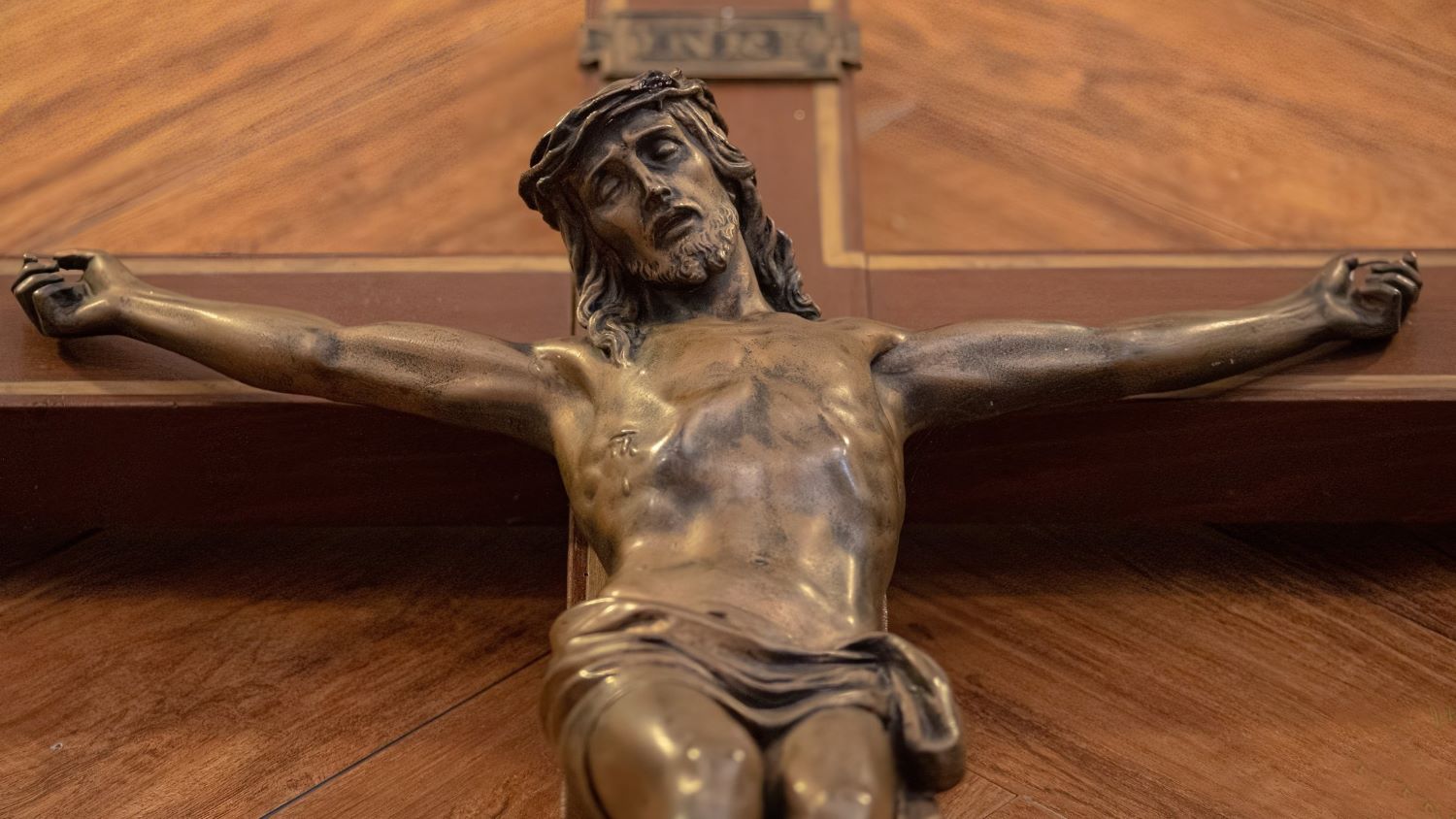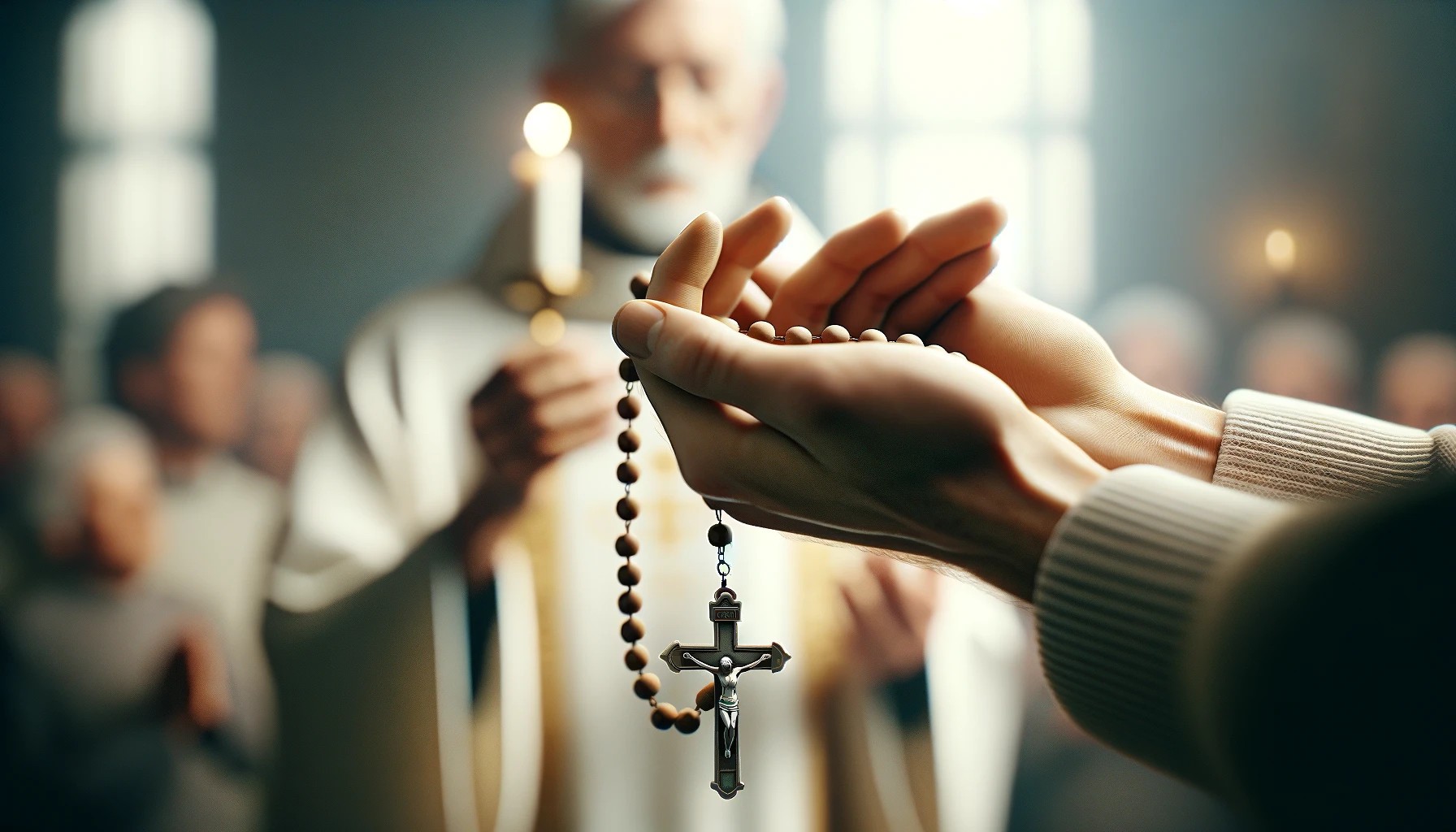Home>Theology and Spirituality>Mortal Sin: What To Do With Communion


Theology and Spirituality
Mortal Sin: What To Do With Communion
Published: February 19, 2024
Ericka Andersen, an editor at Christian.net, expertly merges digital strategy with content creation, focusing on faith and societal issues. Her communication skills enhance the platform's engaging narratives, fostering meaningful dialogue on belief's impact on society.
Discover the theological implications of receiving communion and learn how to approach this sacred act with reverence and understanding. Explore the spiritual significance of communion in the context of mortal sin.
(Many of the links in this article redirect to a specific reviewed product. Your purchase of these products through affiliate links helps to generate commission for Christian.net, at no extra cost. Learn more)
Table of Contents
Introduction
The concept of mortal sin and its implications in relation to receiving communion is a topic of profound significance within the realm of theology and spirituality. It delves into the core beliefs and practices of various religious traditions, offering insights into the moral and spiritual dimensions of human existence.
Mortal sin, often defined as a grave transgression against divine law, carries immense weight in religious teachings. It is considered a rupture in the relationship between an individual and the divine, leading to profound spiritual consequences. The gravity of mortal sin is underscored by its potential to sever the soul from the grace of God, thereby impacting one's spiritual well-being.
In the context of communion, a sacred sacrament symbolizing the unity of believers with Christ, the implications of mortal sin become particularly poignant. The act of receiving communion is imbued with profound spiritual significance, representing a deeply personal encounter with the divine. However, the question arises: What should one do if they find themselves in a state of mortal sin when approaching communion?
This complex and deeply personal dilemma has prompted extensive theological reflection and pastoral guidance within religious communities. It raises fundamental questions about the nature of sin, the pursuit of spiritual reconciliation, and the transformative power of divine grace. As such, exploring the intersection of mortal sin and communion offers a compelling opportunity to delve into the depths of human spirituality and the quest for divine communion.
In the subsequent sections, we will delve into the theological underpinnings of mortal sin and communion, examining their significance within the context of religious teachings. We will explore the implications of mortal sin on the reception of communion, as well as the guidance provided by religious authorities for individuals grappling with this profound spiritual challenge. Through this exploration, we aim to shed light on the complexities of mortal sin and communion, offering insights that resonate with the spiritual journeys of individuals seeking reconciliation and communion with the divine.
Read more: What Is Mortal Sin In Catholicism
Understanding Mortal Sin
Mortal sin, within the theological framework of various religious traditions, is characterized by its grave nature and profound spiritual implications. It is often defined as a deliberate and serious violation of divine law, resulting in the estrangement of the individual from God's grace. The gravity of mortal sin is underscored by its potential to sever the soul from the divine presence, leading to spiritual alienation and moral culpability.
In Catholic theology, mortal sin is understood to meet three conditions: it must involve a grave matter, be committed with full knowledge of its gravity, and be done with deliberate consent. This stringent criteria reflects the severity of mortal sin, emphasizing its conscious and willful nature. The gravity of mortal sin is further accentuated by its capacity to rupture the sanctifying grace within the soul, thereby jeopardizing the individual's spiritual well-being.
The concept of mortal sin is deeply intertwined with the moral fabric of human existence, addressing fundamental questions of ethical conduct and spiritual accountability. It serves as a moral compass, delineating the boundaries of permissible actions and underscoring the consequences of transgressing divine precepts. The gravity of mortal sin resonates with the profound responsibility that individuals bear in their moral choices, highlighting the weight of their actions within the cosmic framework of divine justice and mercy.
Moreover, the understanding of mortal sin extends beyond a mere catalog of prohibited actions; it delves into the depths of human consciousness and moral agency. It invites individuals to reflect on the implications of their choices, recognizing the profound impact of their decisions on their spiritual journey and relationship with the divine. This introspective dimension of mortal sin underscores its significance as a catalyst for moral discernment and spiritual growth, prompting individuals to confront the complexities of human frailty and the pursuit of moral rectitude.
In essence, understanding mortal sin entails grappling with the profound implications of human agency and moral responsibility within the divine order. It beckons individuals to navigate the intricate terrain of ethical decision-making, recognizing the weight of their choices in shaping their spiritual destiny. As such, the concept of mortal sin serves as a poignant reminder of the enduring tension between human fallibility and the transcendent call to moral and spiritual integrity.
The Importance of Communion
At the heart of many religious traditions, communion holds profound significance as a sacred sacrament symbolizing the spiritual union between believers and the divine. It serves as a poignant expression of the intimate relationship between the human soul and the transcendent realm, embodying the transformative power of divine grace and the communal bond among the faithful.
Communion, often referred to as the Eucharist in Christian traditions, represents a sacred moment of encounter with the divine presence. It is a symbolic reenactment of the Last Supper, where Jesus Christ shared bread and wine with his disciples, imbuing these elements with profound spiritual significance. Through the act of communion, believers partake in the spiritual nourishment symbolized by the bread and wine, experiencing a profound sense of unity with Christ and the community of believers.
The importance of communion extends beyond its symbolic value; it encompasses the spiritual nourishment and sustenance it offers to the faithful. In partaking of the Eucharist, believers are invited to enter into a deep communion with the divine, receiving the grace and blessings that flow from this sacred encounter. The act of communion is imbued with transformative power, offering believers the opportunity for spiritual renewal, healing, and sanctification.
Furthermore, communion serves as a unifying force within religious communities, fostering a sense of shared spiritual identity and communal belonging. It symbolizes the unity of believers in their shared faith and devotion, transcending individual differences and uniting them in a collective expression of reverence and worship. Through communion, believers are reminded of their interconnectedness within the spiritual tapestry of their religious tradition, reinforcing the bonds of fellowship and mutual support.
The significance of communion also resonates with its role in fostering spiritual growth and moral transformation. It serves as a catalyst for inner renewal and ethical awakening, inviting believers to embody the virtues of compassion, forgiveness, and selflessness exemplified by the life and teachings of their spiritual tradition's founder. Communion thus becomes a sacred journey of personal and communal transformation, guiding believers toward a deeper alignment with the divine virtues and principles.
In essence, the importance of communion lies in its multifaceted role as a symbol of divine presence, a source of spiritual nourishment, a unifying force within religious communities, and a catalyst for moral and spiritual growth. It embodies the timeless significance of the sacred encounter between the human soul and the transcendent realm, offering believers a profound opportunity for communion with the divine and the transformative power of divine grace.
Church Teachings on Mortal Sin and Communion
In the teachings of the Catholic Church, the relationship between mortal sin and the reception of communion is a matter of profound theological significance. The Church emphasizes the gravity of mortal sin and its implications for the spiritual state of the individual. According to Catholic doctrine, those who are conscious of being in a state of mortal sin are instructed not to receive communion until they have sought reconciliation through the sacrament of confession.
This guidance stems from the understanding that mortal sin ruptures the sanctifying grace within the soul, severing the individual from the divine presence. By refraining from receiving communion in a state of mortal sin, the Church underscores the need for spiritual reconciliation and the restoration of grace within the soul. This approach reflects the Church's commitment to upholding the sacredness of communion and the integrity of the sacramental life.
Furthermore, the Church's teachings on mortal sin and communion underscore the transformative power of the sacrament of reconciliation, also known as confession. Through the sacrament of confession, individuals are offered the opportunity to seek forgiveness for their sins, experience spiritual healing, and be reconciled with God and the community of believers. This process of reconciliation is regarded as essential for restoring the soul to a state of grace, thereby preparing the individual to receive communion in a worthy manner.
The teachings of the Church on mortal sin and communion emphasize the profound connection between spiritual integrity and the reception of the Eucharist. By acknowledging the gravity of mortal sin and the need for reconciliation, the Church invites individuals to engage in a process of moral and spiritual discernment, recognizing the transformative potential of divine grace in their lives.
In summary, the Church's teachings on mortal sin and communion underscore the sacredness of the Eucharist and the imperative of spiritual reconciliation. By upholding the integrity of communion and emphasizing the significance of seeking reconciliation in the face of mortal sin, the Church offers a profound framework for individuals to navigate the complexities of moral responsibility and the pursuit of divine communion.
What to Do if You're in Mortal Sin
Finding oneself in a state of mortal sin can evoke profound spiritual and emotional turmoil. It raises fundamental questions about moral responsibility, divine grace, and the path to reconciliation. In the face of this deeply challenging predicament, individuals are confronted with the imperative of seeking spiritual guidance and discerning a course of action that aligns with their religious beliefs and personal convictions.
When confronted with the reality of being in a state of mortal sin, it is essential to approach the situation with a spirit of humility and introspection. Acknowledging the gravity of one's actions and their impact on the spiritual landscape is a crucial first step. This introspective process involves a candid examination of conscience, wherein individuals reflect on the nature of their transgressions, the underlying motivations, and the implications for their relationship with the divine.
Seeking guidance from a spiritual mentor, such as a priest, minister, or religious counselor, can provide invaluable support and insight during this challenging period. Engaging in open and honest dialogue with a trusted spiritual advisor can offer clarity, solace, and a pathway toward reconciliation. Through this process, individuals can receive pastoral counsel, explore avenues for seeking forgiveness, and discern the steps necessary to restore their spiritual well-being.
Central to the response to mortal sin is the recognition of the transformative potential of divine grace and the sacrament of reconciliation. Embracing the sacrament of confession, wherein individuals confess their sins to a priest and receive absolution, represents a profound opportunity for spiritual healing and restoration. The sacrament of reconciliation offers a sacred space for individuals to express contrition, seek forgiveness, and experience the liberating grace of divine mercy.
Moreover, cultivating a spirit of genuine contrition and a firm resolve to amend one's ways is integral to the process of addressing mortal sin. This entails a sincere commitment to rectify the harm caused by one's transgressions, embrace a path of moral renewal, and strive toward living in accordance with the ethical precepts of one's religious tradition. Such a disposition reflects a profound willingness to undergo inner transformation and embrace the redemptive power of divine grace.
In essence, navigating the reality of being in a state of mortal sin necessitates a conscientious engagement with the principles of moral accountability, spiritual reconciliation, and the pursuit of divine grace. By embracing a posture of humility, seeking spiritual guidance, and embracing the sacrament of reconciliation, individuals can embark on a transformative journey toward healing, restoration, and communion with the divine.
Read more: An Understanding of Mortal Sin and Sins
Seeking Reconciliation
Seeking reconciliation in the aftermath of mortal sin is a profound and transformative journey that encompasses the pursuit of spiritual healing, moral renewal, and the restoration of grace within the soul. At its core, the process of seeking reconciliation embodies the timeless quest for divine mercy and the redemptive power of forgiveness, offering individuals a pathway toward inner restoration and communion with the divine.
Central to the pursuit of reconciliation is the sacrament of confession, which holds a sacred place within many religious traditions. The sacrament of confession provides a hallowed space for individuals to express contrition, acknowledge their transgressions, and seek absolution from a spiritual authority, such as a priest or minister. Through the act of confession, individuals engage in a deeply personal dialogue with the divine, laying bare their moral frailty and seeking the liberating grace of divine mercy. This sacred encounter serves as a catalyst for spiritual healing, offering individuals the opportunity to unburden their souls, receive forgiveness, and embark on a path of moral and spiritual renewal.
Moreover, seeking reconciliation entails a profound commitment to genuine contrition and a sincere resolve to amend one's ways. This transformative disposition encompasses a heartfelt acknowledgment of the harm caused by one's transgressions, a genuine sorrow for having strayed from the path of righteousness, and a resolute determination to embrace a life guided by the virtues and ethical precepts of one's religious tradition. Through this inner transformation, individuals demonstrate a profound willingness to undergo moral renewal, embodying the redemptive potential of divine grace in their lives.
The process of seeking reconciliation also encompasses a deep engagement with the principles of moral accountability and ethical discernment. It invites individuals to confront the complexities of human fallibility, recognize the implications of their actions within the moral framework of divine justice, and embrace the transformative potential of divine grace. This introspective journey fosters a heightened awareness of one's moral agency and spiritual responsibility, guiding individuals toward a deeper alignment with the transcendent virtues and principles that underpin their religious tradition.
In essence, seeking reconciliation represents a sacred odyssey of inner restoration, moral renewal, and the pursuit of divine communion. It embodies the timeless yearning for spiritual healing and the transformative power of divine mercy, offering individuals a profound opportunity to reconcile with the divine, restore grace within their souls, and embark on a journey of moral and spiritual integrity.
Receiving Communion in a State of Grace
Receiving communion in a state of grace holds profound significance within the context of religious sacramental practice. It embodies the sacred act of partaking in the Eucharist, symbolizing the spiritual union between the believer and the divine. The concept of being in a state of grace underscores the individual's spiritual readiness to receive communion, signifying a soul that is free from mortal sin and imbued with the sanctifying presence of divine grace.
Central to the notion of receiving communion in a state of grace is the profound alignment of the individual's spiritual disposition with the sacredness of the Eucharistic encounter. It reflects a soul that is attuned to the transformative power of divine grace, prepared to partake in the spiritual nourishment and communion symbolized by the bread and wine. This state of grace signifies a profound inner harmony, wherein the believer's spiritual integrity and moral rectitude converge with the sacred act of communion, fostering a deep and transformative encounter with the divine.
Moreover, being in a state of grace embodies a profound commitment to moral and spiritual purity, reflecting the individual's conscientious adherence to the ethical precepts and virtues of their religious tradition. It signifies a soul that is receptive to the transformative influence of divine grace, embodying the virtues of compassion, forgiveness, and spiritual humility. This disposition of grace underscores the believer's profound reverence for the sacredness of communion, reflecting a deep yearning for spiritual communion and the transformative power of divine grace.
Receiving communion in a state of grace also embodies the believer's profound commitment to spiritual renewal and ethical awakening. It signifies a soul that is open to the redemptive potential of divine grace, seeking inner transformation and moral rectitude. This state of grace reflects the believer's earnest pursuit of spiritual growth and moral integrity, underscoring a deep yearning to embody the virtues and principles exemplified by the life and teachings of their religious tradition's founder.
In essence, receiving communion in a state of grace encapsulates the believer's profound readiness to partake in the sacred encounter with the divine. It embodies a soul that is aligned with the transformative power of divine grace, reflecting a deep yearning for spiritual communion and moral rectitude. This state of grace serves as a poignant testament to the believer's inner readiness to embark on a sacred journey of communion, spiritual nourishment, and transformative encounter with the divine.
Conclusion
In navigating the intricate terrain of mortal sin and communion, individuals are confronted with profound questions of moral responsibility, spiritual integrity, and the transformative power of divine grace. The intersection of mortal sin and communion represents a poignant juncture where the complexities of human frailty converge with the enduring call to seek reconciliation and communion with the divine.
The concept of mortal sin, characterized by its grave nature and profound spiritual implications, serves as a moral compass within religious traditions, delineating the boundaries of ethical conduct and underscoring the consequences of transgressing divine precepts. It beckons individuals to navigate the intricate terrain of ethical decision-making, recognizing the weight of their choices in shaping their spiritual destiny. The gravity of mortal sin underscores the enduring tension between human fallibility and the transcendent call to moral and spiritual integrity.
Communion, on the other hand, holds profound significance as a sacred sacrament symbolizing the spiritual union between believers and the divine. It embodies the transformative power of divine grace, offering believers the opportunity for spiritual renewal, healing, and sanctification. The act of communion serves as a catalyst for inner renewal and ethical awakening, inviting believers to embody the virtues of compassion, forgiveness, and selflessness exemplified by the life and teachings of their spiritual tradition's founder.
The teachings of the Church on mortal sin and communion underscore the sacredness of the Eucharist and the imperative of spiritual reconciliation. By upholding the integrity of communion and emphasizing the significance of seeking reconciliation in the face of mortal sin, the Church offers a profound framework for individuals to navigate the complexities of moral responsibility and the pursuit of divine communion.
In conclusion, the intersection of mortal sin and communion offers a compelling opportunity for individuals to engage in a process of moral discernment, spiritual reconciliation, and the transformative encounter with the divine. It embodies the timeless yearning for spiritual healing and the redemptive power of divine grace, offering individuals a profound opportunity to reconcile with the divine, restore grace within their souls, and embark on a journey of moral and spiritual integrity.














